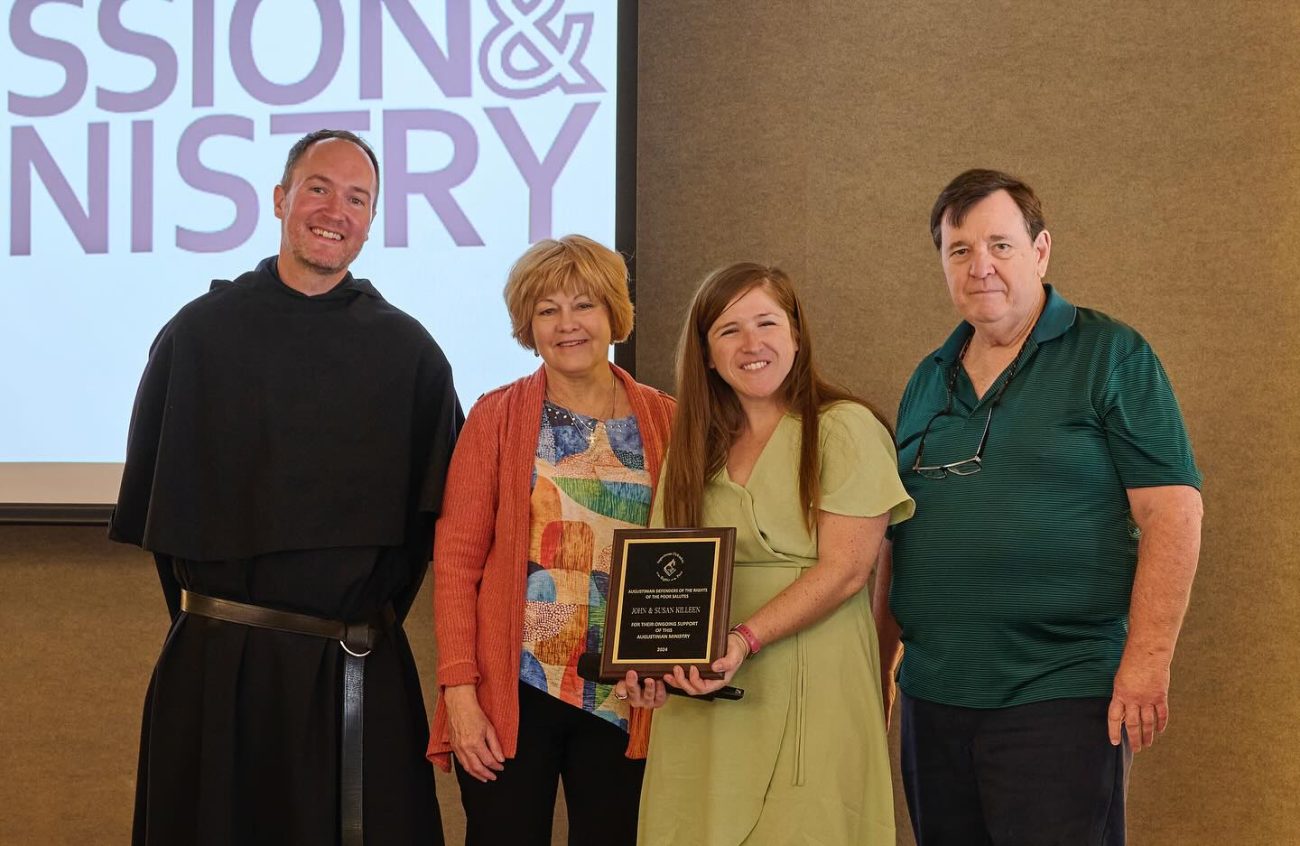They sit in jail, and within the struggles that have pervaded their entire lives.
When they leave prison, their minds, hearts, and souls can remain incarcerated by the shame that remains. Perhaps they or others are imprisoned by addiction, mental health struggles, or a lack of opportunity.
Their families often remain incarcerated by their own struggles, guilt or other shackles of the soul.
For the men and women incarcerated in the criminal justice system, the Augustinian Defenders of the Poor (ADROP) have stepped in, offering what they call “a ministry of criminal justice accompaniment and reform.”
This ministry often changes lives, empties spiritual and emotional poisons, and invites God’s mercy and healing.
“It’s an attempt to attack the stereotype that everybody in prison is rotten and deserves to be there and be forgotten. There is a humanity there,” said George Munyan, who leads the Adeodatus ministry that meets weekly on Thursday nights in the Cascia Center at the National Shrine of St. Rita of Cascia in South Philadelphia.
He joins John and Sue Killeen, who have led ADROP’s Mary, Mother of Captives ministry which in numerous ways lets people who are currently incarcerated know they are not alone. They receive help when they are about to be released from prison and begin their re-entry into society.
The ministry also surrounds families of the incarcerated with faith-filled support and a place to share their struggles.
“When you have a personal experience — you’ve been arrested and in the prison system, or somebody that you love has been incarcerated — it can be a very isolating and lonely experience,” said John Green, ADROP’s executive director.
“The programming that ADROP provides, it gives people a known commonality, like, ‘I don’t have to hide this from you. I don’t have to be worried about how you’re going to judge me.’”
John Killeen runs the Mary, Mother of Captives Pen Pal Correspondence Program that works directly with nearly 1,000 currently incarcerated people in 49 states. It helps remind inmates that they are not abandoned, they are prayed for, and that they matter.
“They’ve all been sent to us from either counselors or chaplains, so it keeps just mushrooming up. The key ingredient is it brings some hope, sunshine, and communications,” John said.
He also assists in the Mary, Mother of Captives Transition Team efforts to help their pen pals re-enter society.
“We prepare them for their parole board hearings, get them what they need to know and how to present it to them. When they come out, we’ve already been working with them. They have resumes ready to go. We help get them right back to work as quickly as possible,” John said.
He said the team has helped formerly incarcerated people become everything from electricians to PhDs, and even a priest.
Sometimes, the emotional and spiritual needs outweigh the practical, and those unmet needs can even be the impediment between someone and their growth.
That’s where Adeodatus comes on Thursday nights to open doors of healing for the formerly incarcerated, or for those who face the internal prisons of addiction and mental health challenges. Mary, Mother of Captives’ Family Support Groups allow the same opportunity for non-judgmental openness to share their struggles and find both community and spiritual healing.
“We read the Gospel for the week. We turn the lights out and by silent meditation with just a candle, we just wait in silence for people to try to push reality back a little and pressures of life gets clarity of thought and find a trusted audience to unload their burden in confidentiality,” said Munyan about Adeodatus.
“From our mission, we have found a person who came up from the streets of Kensington, the gutter, basically of Kensington. His brother and mother died, and he has become a Franciscan friar and is working towards his ordination.”
The Family Support Group gives the same confidentiality, the same emotional connection, the same healing to parents, family members and loved ones of incarcerated individuals.
“Being a mom of a child that went to prison, it’s a very lonely time. You are embarrassed. You don’t know what to do. You’re afraid to tell your family. You’re afraid to tell your neighbors,” said Sue Killeen, who runs the Family Support Group.
“When you first come down into our meeting, you are in tears most of the time, and you don’t know what to expect. We have a group of people there that have been through it, know what’s what the system is like and how you feel when you have a Mother’s Day or a Christmas without your child.”
Each of these ADROP ministries provide a different type of catharsis, an emptying of shame, an opportunity for human connection with someone who often has walked a proverbial mile in their shoes. Each ministry allows God to work in a unique, healing way.
“It’s a very safe spot,” said Sue Killeen, “There is a place for them to go.”
For more information and ways to volunteer, donate or find support, click here for the ADROP Criminal Justice Accompaniment and Reform programs page.
PREVIOUS: God’s Presence in a Whiffleball Game? In Challenger League, Believe It
NEXT: ‘Queridos’ Art Exhibit Pens Cuban-American’s Love Letter to Phila.



Share this story